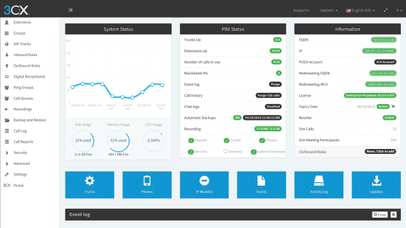A lot of companies are looking for a way to upgrade their phone systems. It’s important because it saves money, time, and provides more features than your traditional landline legacy phone system. If you would like to learn more about how a cloud based 3CX phone system can help you achieve these goals, please read on!
3CX is the perfect solution for any size business that wants an easy-to-use yet powerful phone system with advanced features such as VoIP and Unified Communications. In this blog post we will explore why 3CX is the best option for all businesses large or small!
The 3CX Cloud Phone System is the perfect solution for businesses of any size. They offer a variety of packages, including one that is free to get your company started with cloud-based phone service. Why not upgrade today?
3CX offers great features like instant messaging, web conferencing and instant messaging integration. It’s never been easier to manage your business communications.
3CX is a business communications solution that offers enterprise-grade features at an affordable price. The 3CX API enables developers to integrate with other productivity tools and CRM systems, or even create their own software.
3CX phones offer many benefits for organizations of all sizes. One of these benefits includes the ability to use your smartphone as a wireless handset for making calls on the go! Another one of 3Cx’s benefits is its customisable GUI which allows users to organise their workspace according to their needs, whatever those may be!
3CX is a cloud-based IP PBX (phone system) with the capacity to connect over 500 extensions. It has an open architecture, which means it can integrate with any voice or data network and supports many of the major telecom SIP Trunking protocols. 3CX offers remote management, call recording, auto attendant, voicemail notification of new messages into email inboxes and much more!
Remote working is a reality for many of us and 3CX has the perfect solution to make it work. The software, which can be installed on Windows or Mac computers, allows you to phone using your voice and data connections from anywhere in the world with no additional hardware required. It also takes care of all of your call routing needs so that you never miss a call again! With an intuitive interface and cutting-edge features like voicemail transcription, we’re confident that remote workers will feel at home with 3CX.
3CX is a cloud-based PBX system with many impressive features. It has all of the standard features you would expect from a PBX including voicemail, call forwarding, caller ID blocking etc., but they have made their product more appealing by adding additional features specific to remote workers. It allows users to log into the service on any device or browser that supports HTML5.
3CX’s user-friendly softphone lets you manage calls, meetings, and chats from your desktop browser or mobile phone app. Manage your own and your colleagues availability or presence showing interactive statuses, and push incoming calls to any tab or web page and automatically configure your office hours in just a few clicks.
Withe ability to launch calls directly from your CRM or Microsoft Teams for seamless customer interactions. Inbound calls can be immediately matched to customers, using the caller ID giving employees all the information they need to deliver exceptional customer experience. Accurate call reporting of inbound and outbound calls with call duration allows you to generate insightful reports on customer and employee activities.
There are so many reasons why you should select a cloud based phone system from 3CX! What do you think? Are you ready to get started with 3CX? Why not contact one of our customer service representatives at Juno Telecoms.
















